|
|
|
Sort Order |
|
|
|
Items / Page
|
|
|
|
|
|
|
| Srl | Item |
| 1 |
ID:
108123
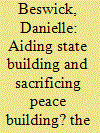

|
|
|
|
|
| Publication |
2011.
|
| Summary/Abstract |
This article explores the relationship between the UK and Rwanda, using the lens of the UK Department for International Development's integrated approach to state building and peace building in fragile and conflict-affected states. It identifies a number of priorities for UK aid under such a framework, but shows that in the case of Rwanda these have not been foregrounded in the bilateral aid relationship. The article suggests a number of reasons for this, arguing that, by refusing to acknowledge or address Rwanda's deviations from what was considered a positive development trajectory, the UK is becoming internationally isolated in its support for the rpf regime. It concludes that, while this bilateral relationship may support achievement of stability and relative security in Rwanda, promoting such a narrow form of state building is detrimental to more holistic peace building, both nationally and regionally.
|
|
|
|
|
|
|
|
|
|
|
|
|
|
|
|
| 2 |
ID:
108115
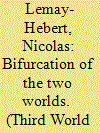

|
|
|
|
|
| Publication |
2011.
|
| Summary/Abstract |
Studies increasingly highlight the limits of state building conducted 'from the top-down'. Building on the literature and using a Rosenauian concept in a novel way, this article posits that international interventions create a 'bifurcation of the two worlds'. Departing from a study of Kosovo and Timor-Leste, the article posits that the massive arrival of staff involved in international governance will create a social gap between the international and the local 'worlds', which will in turn become a target of narratives of resistance by local actors. This bifurcation is exemplified by the 'white car syndrome', a concept representing the horde of white UN vehicles accompanying major interventions and developed in this contribution. Thus, the article attempts to shed new light on the legitimacy crises that Kosovo and Timor-Leste experienced at the beginning of the current century, while demonstrating and increasing the linkages between development studies and peace studies.
|
|
|
|
|
|
|
|
|
|
|
|
|
|
|
|
| 3 |
ID:
108120
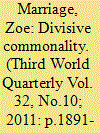

|
|
|
|
|
| Publication |
2011.
|
| Summary/Abstract |
Northern donor policies relating to building a common future and building peaceful states and societies go to the heart of national and international security agendas. This article critiques the concept of commonality between donors and recipients and within recipient countries. It argues that the policies are problematic from the perspective of security theorising, both in their mooted 'commonality' and in terms of the political intervention that they imply. Historically security has been competitive and founded on compromise rather than commonality, and the internal legitimacy of states has been contested domestically, rather than 'built' from outside. Using the example of the Democratic Republic of Congo, the article argues that the ahistorical assumptions of these policies and the activities they license have entrenched specific forms of insecurity. There have been some returns to the donors and implementing partners but also some costs, which had not been calculated, as lessons have not been drawn from past experiences.
|
|
|
|
|
|
|
|
|
|
|
|
|
|
|
|
| 4 |
ID:
108118


|
|
|
|
|
| Publication |
2011.
|
| Summary/Abstract |
This article critically analyses the state-building agenda from a governance and aid policy perspective, and from an anti-corruption viewpoint in particular, highlighting potential problems with both theoretical and practical applications of state building in a development context. Inconsistencies and contradictions between the state building and anti-corruption work have not been adequately explored or reconciled. In particular, the article explores these tensions using the example of the Performance-Based Governors' Fund (pbgf) in Afghanistan, where some donors are looking to reduce corruption in local government, encouraging often 'warlord' governors to run their administrative offices with integrity. The article argues that the pbgf approach-with its themes of being realistic, going for indirect strategies over the long term and building integrity rather than fighting corruption, provide important lessons for the anti-corruption community as a whole, both at the level of theory and practice.
|
|
|
|
|
|
|
|
|
|
|
|
|
|
|
|
| 5 |
ID:
108110


|
|
|
|
|
| Publication |
2011.
|
| Summary/Abstract |
Both academic literature and popular ideas focus on the ways in which globalisation might be leading to convergence in the ways in which societies are governed. This is misleading. There are marked differentiation processes. Patterns of governance are diverging. These divergences are concentrated in smaller, poorer countries outside the ranks of the oecd and bric/emerging economies category. This article focuses on the ways in which these divergences are driven by changes in sources of government and elite revenues ('political revenues'). As a result of late 20th century globalisation, fewer governments are funded by broad general taxation, and elites in poor countries face increased incentives to use their power for personal profit rather than the collective good. The emergence of 'failing' or 'weak' states is not an isolated or random phenomenon, but an aspect of a broader shift in the character of public authority. That understanding has direct implications for the policies employed to combat the problem.
|
|
|
|
|
|
|
|
|
|
|
|
|
|
|
|
| 6 |
ID:
108109
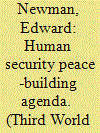

|
|
|
|
|
| Publication |
2011.
|
| Summary/Abstract |
International peace building in post-conflict societies has helped to bring armed conflicts to an end and reduced the recurrence of war. According to some scholars, peace building has therefore contributed to the apparent downward trend of major intra-state conflict in recent years. However, the liberal institutionalist values which underpin international peace building-emphasising democracy, free market economics and the liberal state-have raised a range of criticisms and challenges from scholars as well as local stakeholders in the societies in which peace-building programmes are deployed. In particular, the prevailing approaches to peace-building give insufficient attention to basic and everyday human needs, and promote externally conceived models of state institutions which are not always appropriate. This article explores the problems of contemporary peace building and argues that an alternative vision which draws upon the concept of human security and gives greater emphasis to welfare, livelihoods and local engagement can make peace building more legitimate and sustainable.
|
|
|
|
|
|
|
|
|
|
|
|
|
|
|
|
| 7 |
ID:
108117


|
|
|
|
|
| Publication |
2011.
|
| Summary/Abstract |
This article seeks to contribute to recent debates on the link between political settlements and state building. It proposes a theoretical framework that centres on the alternative concept of 'elite bargain' and suggests that inclusive elite bargains can be expected to facilitate both peace and economic development. Yet a detailed case study of elite bargains in Zambia shows that all good things do not always go together. While inclusive elite bargains have indeed helped to avoid civil war, they have often constrained economic development-a dilemma of unproductive peace.
|
|
|
|
|
|
|
|
|
|
|
|
|
|
|
|
| 8 |
ID:
108111
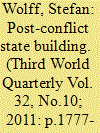

|
|
|
|
|
| Publication |
2011.
|
| Summary/Abstract |
A significant theoretical and empirical question underlying much of the literature on post-conflict state building is which institutions offer the best prospect for peace and democracy in divided societies recovering from conflict. This debate is highly relevant for many developing countries. With much invested by third parties in post-conflict reconstruction and a mixed track record of success at best, the question explored by this article is whether consociational institutional designs-widely applied in policy practice and severely criticised in academic discourse-can accomplish the twin goals of peace and democracy in divided post-conflict societies. Examining the claims of supporters and detractors of consociationalism, the article finds substantial conceptual and empirical evidence that consociational institutions hold significant promise for building democratic states after conflict in divided societies.
|
|
|
|
|
|
|
|
|
|
|
|
|
|
|
|
| 9 |
ID:
108113


|
|
|
|
|
| Publication |
2011.
|
| Summary/Abstract |
This article argues that there is a close link between security sector reform (ssr) and state building. Focusing on UK approaches to state building and ssr, it argues that these are an extension of liberal models containing a number of assumptions about the nature of states and how they should be constructed and that any analysis of ssr approaches needs to be seen within a broader framework of the international community, which tends to see the replacement of 'dysfunctional' societies as desirable both for the people of those states and for the international community. As a result, state building has largely been carried out as a 'technical-administrative' exercise focusing on the technicalities of constructing and running organisations rather than on the politics of creating states, leading to a lack of overall political coherence in terms of where ssr is, or should be, going and of what kinds of state are being constructed. Politics is frequently cited by practitioners as representing a set of obstacles to be overcome to achieve ssr rather than a set of assumptions about actually doing it. The effect of development and security policies working closely together in insecure environments is an overarching emphasis on security at the expense of the harder, more long-term process of development.
|
|
|
|
|
|
|
|
|
|
|
|
|
|
|
|
| 10 |
ID:
108108


|
|
|
|
|
| Publication |
2011.
|
| Summary/Abstract |
This article is intended to analyse two leading approaches that have guided international efforts to promote peace and development in conflict-afflicted fragile states since the 1990s, namely peace building and state building. In a relatively recent development a growing number of donors has sought to bring these two closer together, based upon the perception that the challenges posed by (post-)conflict fragile states need to be addressed through an approach that combines both-'state-building for peace', as the undp has put it. The article thus seeks to explore how the processes of building peace are related to the processes of building more resilient, effective and responsive states in (post-)conflict settings. It provides an overview of the evolution of these two concepts and analyses key complementarities between peace building and state building. It also explores the challenges that arise for both on the basis of these complementarities. The article goes on to examine some of the most significant tensions that arise between the two, and what these tensions may imply for the international assistance community. By way of a conclusion the article offers a few key lessons that emerge from the analysis for improved donor policy and practice in state building for peace efforts.
|
|
|
|
|
|
|
|
|
|
|
|
|
|
|
|
|
|
|
|
|